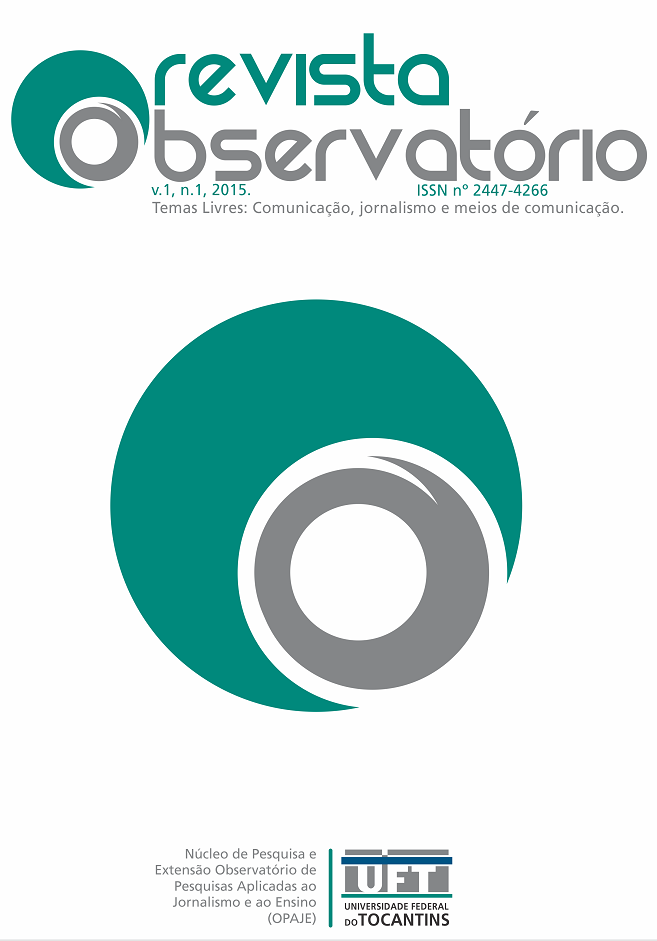The success of the enculturation of mobile in mozambican communities and their multiple social functionality
DOI:
https://doi.org/10.20873/uft.2447-4266.2015v1n1p87Keywords:
Mobile, Communication, Mobile EconomyAbstract
The structure of the work is built in two stages: The first discusses employability in the governance mobile monitoring device. In this approach to reflect back to the surface the issue of the use of SMS messages in the monitoring of electoral processes. The second phase focuses on the mobile phone in the communicative process in rural areas, which are emphasized in the latest technological advances in communications the impact infrastructure; the third phase describes the phone incorporating on business development processes and business transactions, with the focus on consultation with PayPal and services payments.
Downloads
References
Referências
Associação Empresarial de Comunicações de Portugal. Análise de Mercado de Moçambique. Lisboa: Associação Empresarial de Comunicações de Portugal (ACIST), 2015, p.1-52. Disponível em: http://www.acist.pt/publicacoes/estudos/dados_sobre_mocambique_vopen.pdf. Acessado em: 28.set.15.
GSMA. The Mobile Economy. United Kingdom: GSMA, 2015, p. 1-82. Disponível em: http://www.gsmamobileeconomy.com/GSMA_Global_Mobile_Economy_Report_2015.pdf. Acessado em: 28.set.2015.
HAMELINK, Cee. A política de comunicação global, Revista Logos, n. 28: Globalização e comunicação internacional, Rio de Janeiro, ano 15, 2008, pp. 10-25.
HILL, Jill. Regulatory Models for broadcasting in Africa. In: Broadcasting policy and practice in Africa. London: Article 19, 2003, p. 1-233. Disponível em: http://www.article19.org/data/files/pdfs/publications/africa-broadcasting-policy.pdf. Acessado em: 20.mar.2013.
LEVINGSTON, Steven. A Evolução dos Sistemas de Informação em África: Um Caminho para a Segurança e a Estabilidade. Washington, D.C.: Centro de Estudos Estratégicos de África, 2011, p. 1-70. Disponível em: http://africacenter.org/wp-content/uploads/2011/09/ARP_2_POR.pdf. Acessado em: 30.jan.2012.
MACAUHUB. Movitel, Terceiro operador de telefonia móvel de Moçambique iniciou actividades. Macau: Macauhub, 2015. Disponível em: http://www.macauhub.com.mo/pt/2012/05/16/movitel-terceiro-operador-de-telefonia-movel-de-mocambique-iniciou-actividade/. Acessado em: 28.set.2015.
PNUD. Mobile Technologies and Empowerment: Enhancing human development through participation and innovation. New York, NY: United Nations Development Programme, 2012, p. 1-58. Disponível em: http://www.undp.org/content/undp/en/home/librarypage/democratic-governance/access_to_informationande-governance/mobiletechnologiesprimer.html. Acessado em: 02.mai.2014.
UNESCO. Turning on Mobile Learning: Illustrative Initiatives and Policy Implications in Africa and Middle East. Paris: United Nations Educational, Scientific and Cultural Organization, 2012, p. 1-41. Disponível em: http://unesdoc.unesco.org/images/0021/002163/216359e.pdf. Acessado em: 17.jun.2014.
WORLD BANK. Cities and Climate Change. Washington, D.C.: The Word Bank, 2015. Disponível em: http://www.worldbank.org/projects/P123201/coastal-cities-climate-change?lang=en. Acessado em: 02.out.2015.
Downloads
Published
How to Cite
Issue
Section
License
[PT] Autores que publicam nesta revista concordam com os seguintes termos:
1. Autores mantém os direitos autorais e concedem à revista, sem pagamento, o direito de primeira publicação, com o trabalho simultaneamente licenciado sob a Creative Commons Attribution License (CC BY-NC 4.0), permitindo o compartilhamento do trabalho com reconhecimento da autoria do trabalho e publicação inicial nesta revista.
Leia todos os termos dos direitos autorais aqui.

